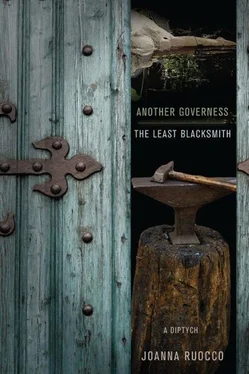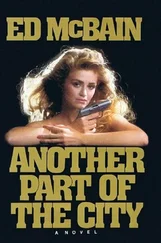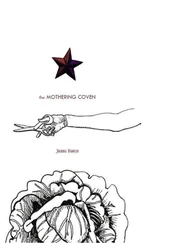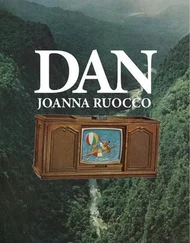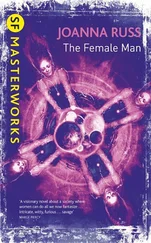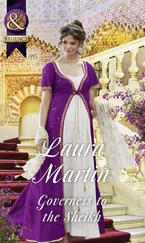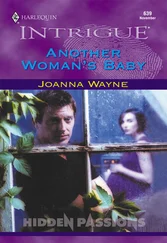Joanna Ruocco
Another Governess / The Least Blacksmith: A Diptych
What marks this severe book is an astounding level of discipline in the prose. Joanna Ruocco, a writer of stark effects, seems to have squeezed her sentences so tightly they are sheer muscle. Just read a few. They are simple, strict, rarely veering from the basic structure you might encounter in a children's book. I thought of the Dick and Jane books, the sing-song cadence of simple factual lines. But this is no children's book. What starts out innocently almost always veers into strangeness or violence. Ruocco does something wonderful here. She builds writing sentence by sentence until, by force of logic, she achieves a genuine discomfort. This is a literary discomfort, borne of that same discipline in the prose. One senses that perhaps Ruocco worked from a deliberately limited vocabulary. Certain words appear with regularity: cakes, glass, fluid, lump, glue, blood, dogs, moat, nits, butcher. She shuffles these words while remaining obedient to her narrative — and there is a beguiling, grisly, poignant narrative here (actually, there are many) — and somehow, through this deliberate practice, meaning grows, a world blooms, a story emerges. It's part fairy tale, part gothic, part domestic, and wholly its own odd species of writing. Listen:
She must be like the mistress, red and fat like the mistress. There is no mistress. I would know if there were a mistress, a red, fat mistress. A mistress does not tolerate offal on the staircase, flies and hornets on the staircase. She does not tolerate boils on the meat. The mistress has gone away from the house. She is buried beneath the tree in the garden by the house. She is buried too deep to come up. The dogs cannot reach her.
A violence is suggested here, but the effect is punishingly flat. Ruocco seems to go out of her way not to provide the usual assistance of adverbs and adjectives. Thank god. Without the symphonic soundtrack meant to telegraph feeling, we have only the haunted content itself, bravely stripped of cues and signals. What I most appreciate here is the sense of tremendous control on display. If these are strange narrative waters, if we are in the hands of an artist determined to navigate her own way, taking nothing for granted in the literary toolkit, we experience Ruocco's sheer control through every sentence, the comforting feeling that she has designed this book not as a container for self-expression, but as a piece of linguistic architecture that could not possibly have been built any other way. This strikes me as the brilliant, ideal approach to literary innovation, and it makes me surrender fully to the gorgeous, original world of Ruocco's narratives. It is so easy to submit to a writer who has this much power — we know there is nothing capricious or random here — and if we are unmoored or delirious or just unsure of what is happening, it is only for a moment, and that confusion turns out to be deliberate, in service of the dark art of this writing. Finishing this book, I thought: I must read everything this writer has written. And: I must tell people that the project of literature is in not just capable hands, but unusual, original ones.
My hair is altogether changed. My face is altogether changed. I am very slim. The dress hangs on me. It slides from my shoulder and the cloth is newly stained. A button dangles. I must repair the button. There is a needle in the nursery. Somewhere there is a needle. I will use it to repair the button. There are children in the nursery. The grunting is the children, the sounds of the children. The children are grunting over the tray of cakes. On the iron table, a big tray of cakes, little cakes, dripping cakes. There are two children grunting over the big tray of cakes. They are on their knees by the cakes. The girl has reddish eyelids and nostrils. The boy is swollen, with dirty skin. Tamworth and Old Spot. I will call them Tamworth and Old Spot. The boy is nearly a man. Spot is a man. The children are grown. They are not children. They are on their knees. That is why they look so small. No one has noticed they are grown because they eat on their knees. Get up, I say to the children. Get up. Get up. The children grunt. Crumbs stick to their cheeks. They move closer to the tray. There are more cakes on the tray. There are more cakes for the children to eat. Get up, I say. Get up. Get up. I clap my hands. The children look up. They stare. Crumbs drop from their mouths. Fluids drip down their chins. They stare. I stand above them in the nursery so they know me even if they do not know my face.
I walk in a small circle on the carpet. Fluids have marked the carpet. I walk in small circles. There is a table in the nursery. There are two chairs. There is a rocking horse. The paint has chipped from the legs of the rocking horse and the tail is ragged, falling short of the fetlocks. Something has chewed the legs, chewed the tail of the rocking horse. Nits fly from the eggs in the gapped mane of the rocking horse. Nits swarm above the crib. I walk to the crib. It is iron. I walk to the rocking horse. Ride on your rocking horse, I say to Spot, but he is too big for the rocking horse. His legs will bend at the knee, his feet on the carpet. He does not ride the rocking horse. There must be another child, a small child, under the linens in the crib. I walk to the window. I look down at the moat. There is a dirty white skin of mist on the moat. Beyond the moat the orchard thickens into the forest. The orchard is filled with pigs. The pigs are shoulder to shoulder, feeding in the orchard. The apples are soft and brown. They are dropping from the trees. They are rotting in the grass. The pigs are slipping in the thick brown flesh of the apples, the broken flesh of the apples. The brown skins of the apples hang in flaps from their bellies. The pigs nip at each other, squealing. The pigs are eating through the apples to the soil. They are eating through the soil. A pig drags a root from the soil, a pale, streaked root, long and stiff, tapered to a white hook. The pig is eating the white root and the root is moistening, blackening with fluids. I croon to the pigs. The pigs must think that they smell me beneath the soil, but I am behind the glass in the high window. I am high above the orchard. I will not go back there anymore. I have misted the window with my breath.
Open your books, I say. The children certainly have books. The nursery is filled with books. I see books on the desks by bottles of black fluid and I see books on the carpet. The crib is filled with books. There are no books on the table. On the table, there are cakes. The children wait by the cakes, on their knees by the cakes. It is not time for cakes. It is time for books. First, in the nursery, cakes. Then books. It is time for books. Not all little children have books. Tamworth and Spot must love their books. There is much to learn in their books. There are no books in the forest. I went to the forest. There were roots, there were rocks, there were leaves. There was mud. I fell in the mud. I slid in the leaves. I crawled over rocks. I lay in a field. I cut a lump on my foot and a worm came out. It was a very black worm. I dried my foot in the sun. There was a hole in the lump on my foot, and the hole leaked yellow fluid. I pulled dark strings from the hole with my fingernails. Pinched between my fingernails, the dark strings did not wiggle. I thought they were worms, but they did not wiggle. They were not worms. I rolled them hard between my fingers. They did not smear. They remained tiny dark strings. They were moist and they left no color on my skin. They were something, not worms or blood, a third thing that worms and blood made together in the lump on my foot. I hobbled to the low stone wall. I lay on top of the low stone wall. I thought about the dark strings in the lump on my foot. They were moving up my legs. I felt them behind my knees. They dammed and swelled in the crook of my arm, under my lower eyelids, curling around and around. I wrapped my foot with canvas that crusted with the yellow fluid. My foot smelled in its canvas wrapper. The farmer held me close then pushed me away. What is that smell? said the farmer. His face was pink, with white hairs, and his mouth was a ragged wet hole like the hole in my foot. My foot, I said, because I knew what smell the farmer meant. Open your foot, I say to the children. I laugh. The children have not noticed that I limp, that I drag myself across the carpet in circles, as though I fall, but every time I fall, I catch myself. I keep moving.
Читать дальше
